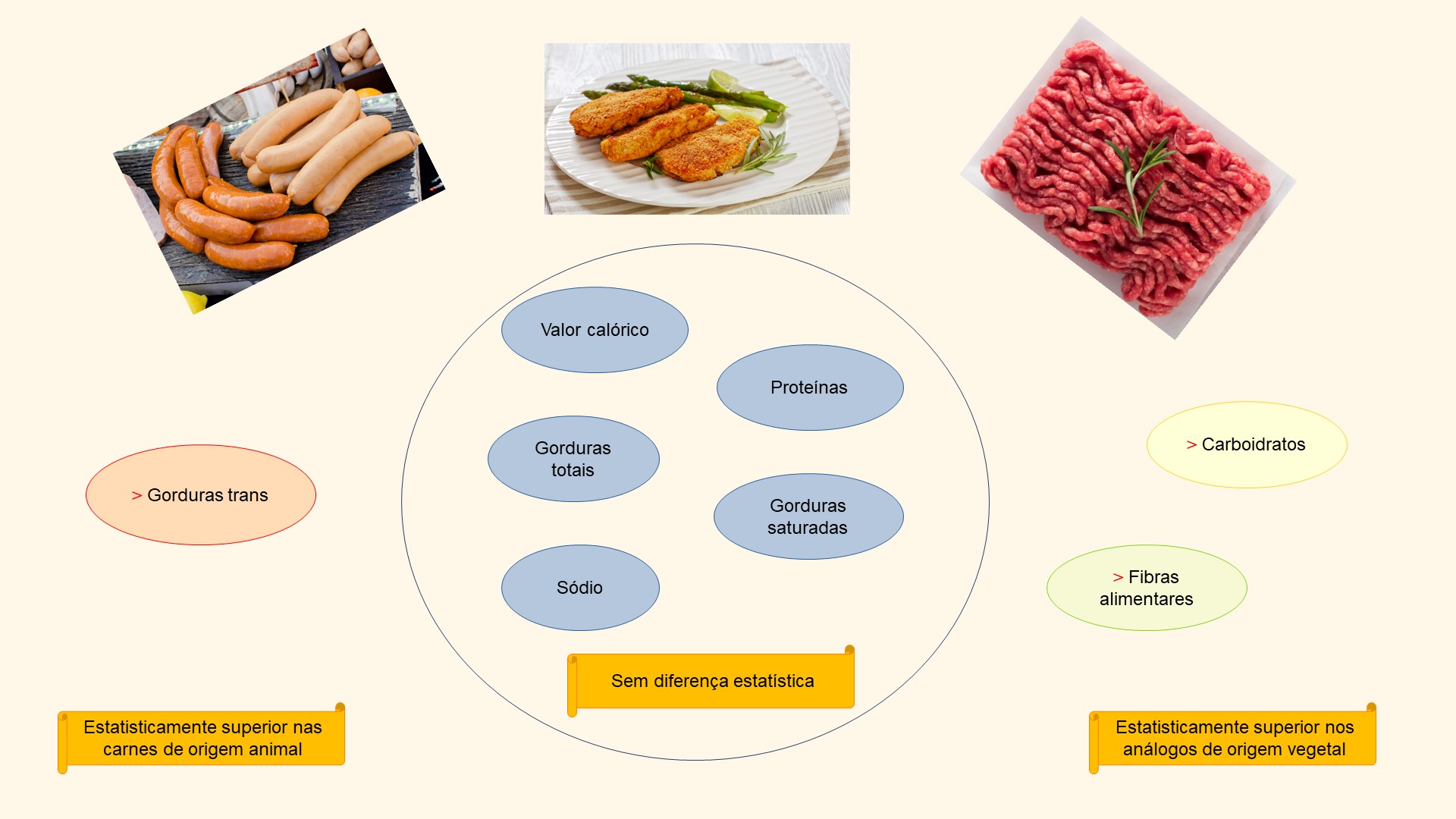Abstract
The growing interest in healthier eating patterns, coupled with ethical and sustainability concerns about meat consumption, has led to a rise in the adoption of plant-based diets. In response to this trend, Western countries have witnessed a surge in the availability of plant-based processed foods aiming to replicate meat products. This study examines the labels of commercially available meat products (MPs) and their plant-based alternative (PbAs) found in major supermarket chains in greater Vitória, Espírito Santo, Brazil. It further evaluates their nutritional content and potential impact on consumer choice contribution to the consumer. Eighty product packages were assessed, comprising 42 MPs and 38 PbAs. Compared to MPs, PbAs showed no significant differences (p > 0,05) in caloric value, protein, total fat, saturated fat, or sodium. Notably, PbAs had higher carbohydrate and fiber content and no trans fats. Therefore, PbAs offer comparable levels of several analyzed nutrients. Consequently, in the absence of specific dietary restrictions (health, cultural, or habitual), substituting MPs with PbAs does not confer significant nutritional advantages.
References
1. Poti JM, Braga B, Qin B. Ultra-processed food intake and obesity: what really matters for healthprocessing or nutrient content? Curr Obes Rep. 2017;6(4):420-31. https://doi.org/10.1007/s13679-017-0285-4
2. Soares KMP, Silva JBA, Góis VA. Parâmetros de qualidade de carnes e produtos cárneos: uma revisão. Hig Aliment. 2017;31(268-269):87-94.
3. Atos do Poder Executivo (BR). Decreto nº 9.013, de 29 de março de 2017. Regulamenta a Lei nº 1.283, de 18 de dezembro de 1950, e a Lei nº 7.889, de 23 de novembro de 1989, que dispõem sobre a inspeção industrial e sanitária de produtos de origem animal. Diário Oficial da União. Brasília, DF, 30 mar 2017. Seção 1(62):3-27.
4. Wolk A. Potential health hazards of eating red meat. J Intern Med. 2017;281(2):106-22. https://doi.org/10.1111/joim.12543
5. Gibbs J, Cappuccio FP. Plant-based dietary patterns for human and planetary health. Nutrients. 2022;14:1614. https://doi.org/10.3390/nu14081614
6. Trautwein EA, McKay S. The role of specific Components of a plant-based diet in management of dyslipidemia and the impact on cardiovascular risk. Nutrients. 2020;12(9):2671. https://doi.org/10.3390/nu12092671
7. Hemler EC, Hu FB. Plant-based diets for personal, population, and planetary health. Adv Nutr. 2019;10(Supplement 4):S275S-S283. https://doi.org/10.1093/advances/nmy117
8. Lynch H, Johnston C, Wharton C. Plant-based diets: considerations for environmental impact, protein quality, and exercise performance. Nutrients. 2018;10(12):1841. https://doi.org/10.3390/nu10121841
9. Gehring J, Touvier M, Baudry J, Julia C, Buscail C, Srour B et al. Consumption of ultra-processed foods by pesco-vegetarians, vegetarians, and vegans: associations with duration and age at diet initiation. J Nutr. 2021;151(1):120-31. https://doi.org/10.1093/jn/nxaa196
10. Ministério da Saúde (BR). Agência Nacional de Vigilância Sanitária. Resolução de Diretoria Colegiada – RDC nº 429, de 8 de outubro de 2020. Dispõe sobre rotulagem nutricional dos alimentos embalados. Diário Oficial da União. Brasília, DF, 9 out 2020. Seção 1(195):106-10.
11. Alcorta A, Porta A, Tárrega A, Alvarez MD, Vaquero MP. Foods for plant-based diets: challenges and innovations. Foods. 2021;10(2):293. https://doi.org/10.3390/foods10020293
12. Hurrell RF. Influence of vegetable protein sources on trace element and mineral bioavailability. J Nutr. 2003;133(9):2973S-2977S. https://doi.org/10.1093/jn/133.9.2973S
13. Ministério da Saúde (BR). Agência Nacional de Vigilância Sanitária. Instrução Normativa – IN nº 75, de 8 de outubro de 2020. Estabelece os requisitos técnicos para declaração da rotulagem nutricional nos alimentos embalados. Diário Oficial da União. Brasília, DF, 9 out 2020. Seção 1(195):113-24.
14. Bernaud FSR, Rodrigues TC. Fibra alimentar: ingestão adequada e efeitos sobre a saúde do metabolismo. Arq Bras Endocrinol Metab. 2013;57(6):397-405. https://doi.org/10.1590/S0004-27302013000600001
15. Chopra S, Arora C, Malhotra A, Khurana SC. Industrially produced trans fat: usage, health implications, global and indian regulations. Indian J Public Health. 2021;65(1):71-5.

This work is licensed under a Creative Commons Attribution 4.0 International License.
Copyright (c) 1969 Christiane Vasconcelos, Srta
